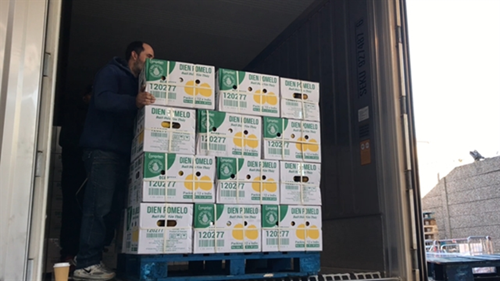Two years into the implementation of the U.K. - Vietnam Free Trade Agreement (UKVFTA), bilateral trade between Vietnam and the U.K. showed positive results. The total trade exchange reached USD 6.8 billion in 2022, up 3.3% growth compared to 2021.
    |
 |
|
Vietnam's "Dien" pomelo exported to the U.K. Changes in the U.K.'s trade policies will make it challenging for Vietnamese exports to compete in the U.K. market due to strict requirements and regulations. |
However, due to the global economic downturn and challenges within the U.K. economy, the import-export volume between Vietnam and the U.K. has experienced a downward trend in the early months of 2023. Although recent months have witnessed a slight upward trajectory, Vietnam’s customs statistics reveal that the accumulated trade volume for the first eight months of 2023 reached USD 4.62 billion, a marginal 0.9% decrease compared to the same period last year. Vietnam's exports to the U.K. amounted to nearly USD 4.1 billion, a slight 0.1% decrease, while imports from the U.K. increased by 6%, reaching USD 460.1 million.
Nguyen Canh Cuong, Trade Counselor of the Vietnamese Embassy in the U.K., said Vietnamese exporters are facing challenges arising from the U.K.'s intensification of its independent economic policies and the signing of additional free trade agreements (FTAs) with other partners.
Notably, the U.K. has been negotiating FTAs with India, Mexico, Israel, and the Gulf Cooperation Council (GCC), while also launching FTA talks with Switzerland, its 10th-largest trading partner with a bilateral trade volume of nearly 53 billion GBP.
On 31 May this year, two new FTAs between the U.K. and Australia and New Zealand also came into force
Moreover, recent policy changes, such as the U.K.'s replacement of the Generalized Scheme of Preferences (GSP) with the Developing Countries Trading Scheme (DCTS), effective from June 19, 2023, pose additional challenges for Vietnamese exports. DCTS, being one of the most generous preferential schemes globally, offers duty-free and quota-free trade for Least Developed Countries (LDCs) and 85% of eligible goods for Low and Middle-Income Countries (LMICs).
According to Cuong, changes in the U.K.'s trade policies will make it challenging for Vietnamese exports to compete in the U.K. market due to strict requirements and regulations, intensifying competition with goods from other countries.
Additionally, the tightening of regulations, the impact of the U.K.'s anti-deforestation and forest degradation bill on wood and agricultural exports, and the rising popularity of specialized diets (vegan, gluten-free, sugar-free) contribute to the complexity and competitiveness of Vietnamese exports to the U.K.
In light of these circumstances, Cuong emphasized the importance of supporting businesses in effectively leveraging the UKVFTA. The Vietnam Trade Office in the U.K. is actively establishing networks with the British business community and Vietnamese enterprises in the U.K. to facilitate partnerships. It provides updated information on quality standards, U.K. import regulations, and actively promotes market opportunities through various channels, including seminars and online workshops.
The trade office is also actively collaborating with the relevant agencies to organize online seminars, facilitate connections with experts and British traders in various sectors, and encourages Vietnamese businesses to participate in exhibitions and trade fairs while actively engaging with the U.K.’s supermarket systems.
Source: VNA